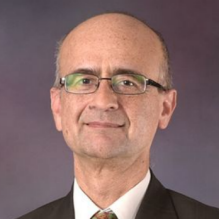Bhavik Bakshi
Professor
Arizona State University
School of Engineering
Abstract
Reinventing the Chemicals and Materials Industry for a Net-Zero, Nature-Positive World
The chemicals and materials industry (CMI) is a major economic driver across the world and its products are essential for our well-being. However, this industry is responsible for 30% of direct greenhouse gas emissions and contributes to ecological degradation due to products such as plastics, artificial fertilizers, and novel chemical entities. It also contributes to land use change and loss of biodiversity. Many corporations, universities and nations have pledged to achieve net-zero emissions within a few decades, but achieving this goal in an economically feasible manner without damage to the environment and society, and while restoring nature is a formidable task that requires systematic methods, models and tools. This talk will introduce the challenges and describe advances toward reinventing the CMI to have net-zero emissions and enable ecological restoration. We will describe a systematic framework for guiding the transition of the CMI and individual products to a sustainable circular economy. This includes a public-domain model of the global CMI, approach for understanding the trade-offs between economic and environmental goals, methods for determining where innovation is most needed, and long-term planning of roadmaps to achieve environmental goals while accounting for long-term changes in the climate, electric grid, and policies. To encourage nature-positive decisions that protect and restore nature, we explicitly account for the role that nature plays in supporting industrial activities and design integrated networks of industrial and ecological systems. Several applications demonstrate how such techno-ecologically synergistic systems can be economically feasible while encouraging ecological protection and restoration. Case studies based on the global chemical industry and circular economy of plastics will convey the practical value of our work. Many challenges remain for future work including convergence of conventional and sustainable engineering.
Bio
Bhavik Bakshi holds the Wrigley Professorship at Arizona State University with appointments in the School for Engineering of Matter, Transport and Energy, School of Sustainability and School of Complex Adaptive Systems. He is also the Richard M. Morrow professor emeritus in the Department of Chemical and Biomolecular Engineering at The Ohio State University. His research is developing systematic methods to ensure that engineering enables an effective transformation toward sustainability. This is resulting in novel designs of products, processes, supply chains and landscapes that contribute to economic prosperity, respect nature’s limits, and are socially just. His contributions include a textbook on sustainable engineering, user-friendly software, and short courses taught across the world. His recognitions include the Education Leadership in LCA Award from the American Council for LCA, the Lawrence K. Cecil Award for environmental chemical engineering from the Environmental Division of the American Institute of Chemical Engineers (AIChE), the Research Excellence award and Education award from the Sustainable Engineering Forum of AIChE, the CAREER award from the U.S. National Science Foundation. He is on the editorial boards of several multidisciplinary journals and has served on government committees such as task forces of the United Nations Environment Program. Prof. Bakshi received his Bachelor of Chemical Engineering degree from the Institute of Chemical Technology in Mumbai, MS in Chemical Engineering Practice and Ph.D. in Chemical Engineering from the Massachusetts Institute of Technology, with a minor in Technology and Environmental Policy through courses and research conducted at Harvard University's Kennedy School of Government.
Wednesday
March 27, 2024

Bhavik Bakshi
Professor
School of Engineering
Arizona State University
- Time: 11:00 AM
- Location: 206 Furnas Hall